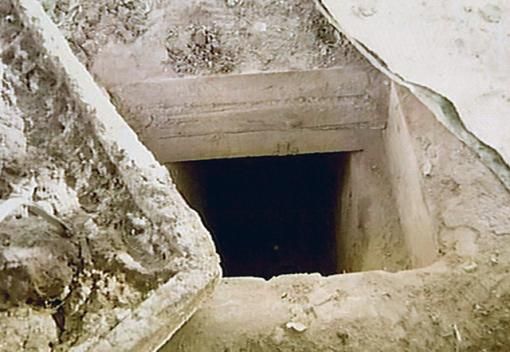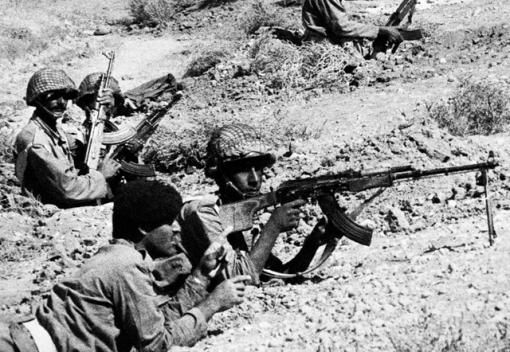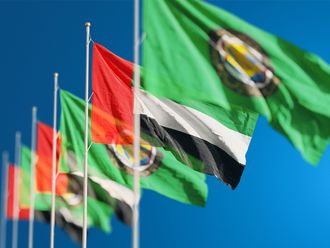Shortly after his arrest in December 2003, former Iraqi president Saddam Hussain was interrogated by the FBI.
The secret interrogation documents, which were made public only recently by the National Security Archive, an independent non-governmental research institute in the US, shed light on the state of mind of Saddam, executed in December 2006.
In this series, Gulf News will run the transcripts of the 20 formal interrogation sessions and five 'casual conversations' he had with a senior FBI agent.
In the second session, Saddam talks about his aversion to Ayatollah Khomeini and the bloody conflict with Iran.
Session 2
February 8, 2004
Baghdad Operations Centre
Interview conducted by George L. Piro
They [the Iraqi Shiites] did not welcome him [Khomeini]."
"If a soldier does not see logic, he will not perform as well or be obedient. If he accepts the task at hand as logical, he will be obedient. A soldier must be convinced, otherwise discipline is a problem."
"The US has paid dearly for its mistakes here in Iraq and throughout the world and will continue to pay for its mistakes all over the world".
Saddam Hussain (High Value Detainee 01) was interviewed on February 8, 2004, at a military detention facility at Baghdad International Airport (BIAP), Baghdad, Iraq. Saddam provided the following information:
Saddam stated the farm where he was captured in December, 2003, was the same location he stayed in 1959 after fleeing Baghdad upon participating in a failed assassination attempt on then Iraqi president Abdul Karim Qasim.
Saddam was asked whether the decision to go to war against Iran in September, 1980, was based on threats from Iran or whether the war was a means of reclaiming Arab/Iraqi territory, specifically the Shatt Al Arab Waterway.
Saddam stated, "We consider the war as having started on September 4, not September 22, as the Iranians state."
Saddam then provided an example of a farmer, who is your neighbour next door.
Saddam preferred to use farming/rural examples as they have special meaning to him: One day, the neighbour's son beats up your son. The next day, the neighbour's son bothers your cows. Subsequently, the neighbour's son damages your farmland by disturbing the irrigation system. If all these things have occurred, eventually, after enough incidents, you approach your neighbour, tell him each transgression by event and ask him to stop. Usually, a warning or approach to the neighbour is enough to stop this behaviour.
With Iran, however, this approach did not work. Iran, in Saddam's opinion, was in violation of the 1975 Algiers Agreement concerning the waterway.
Further, Iran was also deemed to have interfered in Iraqi politics, also a violation of the treaty. In Saddam's opinion, this left Iraq no choice but to fight.
Saddam provided some thoughts about the mindset of the Iranian leadership, specifically Ayatollah Khomeini, and the Iranian decision to fight the war:
When Khomeini came to power in 1979, he had two things which "interfered" with his mind. One, he was a religious fanatic who thought all leaders were like the Shah of Iran, a person easily toppled. Khomeini thought since he removed the Shah easily he could do the same elsewhere, including in Iraq.
Second, Khomeini had a 'complex' about leaving/being kicked out of Iraq previously in the late 1970s. Khomeini, exiled from Iran, had been a 'guest' of Iraq who was "given shelter" in Najaf.
While there, he began speaking out against the Shah and the Iranian government. Khomeini, in Saddam's opinion, was not respecting the written agreement (Algiers Agreement) between Iraq and Iran and was interfering in internal Iranian affairs.
The Iraqi government informed Khomeini of its position. They also told him "you are our guest, no one can ask you to leave or for you to be handed over." The Shah had, in fact, tried to get Saddam to turn over Khomeini to Iran. In Arab culture, one cannot "give up" a guest.
Khomeini refused to cease his activities against the Shah and the Iranian government. Khomeini stated that if his practices were against Iraqi policy, he would leave.
Thereafter, he attempted to depart to Kuwait but was refused entry. Iraq allowed him to return for three or four days and complied with his request for assistance in travelling to another country. Khomeini then travelled to Paris, France.
Saddam stated he does not regret Iraq's treatment of Khomeini. When asked whether Khomeini ignored the gratitude of Iraq upon return from Kuwait, a step which could have resulted in Iraq's refusal to admit him and subsequent transfer to Iran, Saddam stated, "No. It would not have changed the situation. The people did not want the Shah."
Khomeini became a symbol for the people of Iran after departing Iraq because of his age and because he had been 'kicked out' of Iran.
Saddam only stated "maybe" when questioned whether Ayatollah Syed Mohammad Sadr, a prominent Shiite cleric executed in Iraq in 1980, may have been such a symbol. Saddam added he himself was a symbol as one could find pictures of Saddam inside houses and elsewhere in Iraq.
Khomeini believed the Shiite population in southern Iraq would follow him, especially during the war with Iraq. But, according to Saddam, "they did not welcome him." In fact, the Shiite remained loyal to Iraq and fought the Iranians.
Saddam acknowledged that the Iranian military in 1980 was weak and "lacked leadership" as most of the high-ranking officers had been removed upon change of the Iranian leadership from the Shah to Khomeini.
This, however, did not impact on the decision to engage in war with Iran at that moment. Saddam stated, "If the Shah's army still existed, we would have defeated them in the first month."
Under Khomeini, despite lacking leadership, the Iranian military, including the army and the Revolutionary Guards, "advanced in thousands" against the Iraqi forces. The Iraqi army fought bravely, especially at the borders.
Saddam was asked whether assassination attempts against Iraqi government officials prior to the conflict, allegedly at the hands of Iranian-backed groups, including foreign minister Tariq Aziz and minister of culture and information Latif Nayyif Jasem, affected the decision to go to war with Iran.
Saddam stated there were "540 assaults" on Iraq by Iran before the war. 249 of these "assaults" included air incursions or raids.
Iraq presented this information to the United Nations. Iran blocked the Shatt Al Arab waterway and sank Iraqi and foreign ships.
Before September 29, 1980, Iran bombed Iraqi oil refineries in Basra and other cities in southern Iraq. The assassination attempts against Aziz and Jasem, and others, were among the many incidents leading up to war with Iran.
When asked the objective of the war, Saddam replied, "Ask Iran. They began the war. I have explained all the reasons for the war before."
Upon repeating the question, Saddam stated the objective was "to have Iran not interfere in our internal affairs." Saddam repeated some information previously provided including the fact that he believed Iran violated the treaty of 1975 (Algiers Agreement).
Iran occupied the entire Shatt Al Arab waterway, while the agreement stated their right to only half. Iran did not respond to diplomatic communications regarding these facts.
Saddam stated Iraqi forces initially succeeded and occupied cities and territory in southern Iran just across the border including areas in and near Muhamra (Khorramshahr), Ahvaz and Dezful.
Iraqi forces did not push further into Iran because the immediate objective was to stop artillery attacks from Iran which emanated from areas near the border.
After approximately two years, Iraqi forces were pushed back and the war became defensive for Saddam's military. When questioned why the war became defensive for Iraq, Saddam stated that "one can not plan for the Iraqi army the same as for the American army." From a military viewpoint, plans are made according to capability. The military agrees that when supply routes are lengthened, problems arise.
Saddam stated, "The soldier of today is not the same as the soldier of 100 years ago." They are part of a "universal group" hearing and seeing things on the television and radio.
The soldier is "part of the world" and is "affected" by this. If ordered to counterattack, the soldier will push to the objective and beyond.
Saddam agreed that the later Iraqi offensive stage of the war in 1986-87 saw many successes, including the capture of three-fourths of Iranian tanks and half of the artillery and armoured personnel carriers.
Saddam discussed the reasoning behind not advancing further into Iran. He repeated that Iraq had recovered enough territory, removing the threat of Iranian artillery, in the early years of the war.
Saddam said, "If we went deep inside Iran, they would think we wanted something else." He added, "We did not face a regular army, which is easier to plan against."
Saddam also said that for many Iraqi soldiers this was their first combat experience. Many were "pumped up" especially with the early advances into Iranian territory. Within a few days, however, many soldiers thought "Why am I here?"
As confirmed to Saddam by the Iraqi military leaders, many soldiers preferred to defend the borders and remain in Iraq. Withdrawal of Iraqi forces from Iranian territory should have occurred before this change in mentality took place.
Some military commanders wanted to remain, others wanted to withdraw. After two years of war, some Iraqi military leaders felt Iran had "learned its lesson" and recommended withdrawal. Saddam respected information from the military commanders and ordered withdrawal of Iraqi forces.
Saddam stated, normally, defensive operations are not "good from a tactical standpoint" nor are they good for the soldiers' morale.
Saddam said, "If a soldier does not see logic, he will not perform as well or be obedient. If he accepts the task at hand as logical, he will be obedient. A soldier must be convinced, otherwise discipline is a problem."
Saddam commented about the present mental state of American soldiers in Iraq. He said, "If you asked the American soldier, who came to Iraq to find weapons of mass destruction, but none could be found, and who came to remove the leaders of the Saddam dictatorship, who are all in jail now, but are replaced with other dictators, whether he wanted to stay or go, he would say go."
When asked whether the use of chemical weapons by Iraq against Iran occurred only through necessity, i.e., Iraq would have lost the war without such use, Saddam responded, "I do not have an answer for that. I am not going to answer.'
When asked whether he thought Iraq was going to lose the war with Iran, particularly after 1982 and during the 1984-86 time frame, Saddam responded, "No. Not for a second. I said this on television. I said this in five letters I sent to Iran."
In the letters, Saddam outlined the strengths of the Iraqi military. Saddam stated some Iraqi commanders did not like the fact that this type of information was included in letters to Iran. Iranian leaders thought Saddam was lying, while Iraqis believed him.
Returning to Iraqi chemical weapons use, Saddam stated, "I will not be cornered or caught on the same technicality. It will not do you any good. The United States has paid dearly for its mistakes here in Iraq and throughout the world and will continue to pay for its mistakes all over the world."
Saddam stated Iran did not "get the message" after 1982 when Iraq pulled back to its borders. He stated, "If you do not break their heads, they will not understand."
Saddam stated Iraq "did not owe much money" after the war. Iraq had received aid from Arab countries, which Saddam believed to be aid and not loans.
After the war, however, these countries "changed their minds" and demanded repayment. Some countries viewed Iraq as a military threat. Iran was not viewed as a military threat, as its forces were devastated by the war.
Saddam laughed at this point.
Saddam stated Iraq agreed to a United Nations resolution on September 28, 1980 calling for a cessation of hostilities with Iran. Tehran, however, did not agree to this resolution.
Saddam added that Iraq also agreed to UN Resolution 598 in 1987 calling for an end to the war. Iran, again, did not agree to this resolution. Iraq, in fact, attempted numerous times throughout the war to engage Iran in discussion in order to stop the fighting.
Saddam stated "we did this when we did not have to" for the good of the people and for humanity. Iran only accepted terms of a ceasefire in 1988 "after they lost the war."
Regarding UN findings about Iraq's use of chemical weapons during the Iran-Iraq War, Saddam stated, "History is written and will not change. No one can stop history from being written."
Saddam pointed out that Iran used chemical weapons first, at Muhamra (Khorramshahr), in September/October, 1981. When asked whether Iraq had to use chemical weapons for defensive reasons, Saddam responded, "I am not going to answer, no matter how you put the question."
Saddam stated, "I will discuss everything unless it hurts my people, my friends, or the army." He gave details of an incident in 1964 involving Ahmad Hasan Al Bakr, then general secretary of the Baath Party.
Bakr and Saddam, who was chief of the military branch of the Baath at that time, were arrested for plotting a coup against the then Iraqi president Abdul Rahman Aref.
Saddam stated he admitted full responsibility for the plot and could not have provided information against anyone else.
Saddam stated, "It is not fair for someone in charge to blame others. If someone says 'Saddam told me to do it', that is not a problem for me and does not hurt me."













